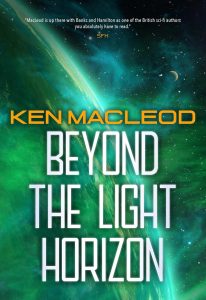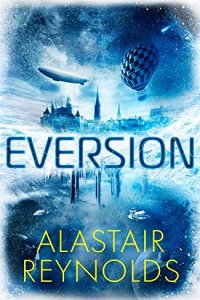Niall Harrison Reviews Beyond the Light Horizon by Ken MacLeod
 Beyond the Light Horizon, Ken MacLeod (Orbit 978-0-356-51482-6, £10.99, 336 pp, tp) May 2024. Cover by Duncan Spilling. (Pyr 978-1-64506-066-6, $21.00, 336pp, tp) June 2024.
Beyond the Light Horizon, Ken MacLeod (Orbit 978-0-356-51482-6, £10.99, 336 pp, tp) May 2024. Cover by Duncan Spilling. (Pyr 978-1-64506-066-6, $21.00, 336pp, tp) June 2024.
Are Ken MacLeod novels realistic? Twenty-five years ago I would have said no. Reading the Fall Revolution series (1995-1999) as a teenager, part of the thrill (I see now) was the vivid granular depiction of a world that (I thought then) didn’t work that way anymore: a world in which the honourable slow boring of hard boards was regularly overturned by shadowy state tectonics; a world, in other words, in which history had not ended. But the 21st century soon made it clear that history, if it even ever paused, was going to do its best to make up the lost time. Now reading Beyond the Light Horizon, the concluding volume of The Lightspeed Trilogy, when the world seems a little darker and I am a little older, MacLeod’s sensibility does seem more realistic. This is perhaps an odd thing to say about a trilogy that postulates working FTL and encounters with a variety of alien species; but its extrapolated multipolar world, divided between political systems with clear lineages from our own time, facing challenges such as climate and AI, has a ring of inexorability about it.
The main action of the trilogy takes place over the course of six busy months from October 2070 to April 2071. Book one, Beyond the Hallowed Sky (2021), describes the initial discovery of lightspeed technology by Lakshmi Nayak, a brilliant physicist in the Alliance (Anglosphere plus India, minus Scotland and Ireland), her defection to the Union (descended from the current EU, plus Scotland, via a political revolution known as the Rising), and the construction of the Union’s first FTL starship by John Grant, an engineer who – coincidentally – has stumbled on the fact that both the Alliance and a third global power, the Co-ordinated states (China and Russia) already have FTL and have been secretly exploring at least one exoplanet, called Apis. The novel is methodical, tangible, and deftly balances big SF moments with the texture of everyday life in the Union.
Book two, Beyond the Reach of Earth (2022) is filled with highly enjoyable plot shenanigans that showcase MacLeod’s love for the SF megatext; perhaps they are at times a little too obviously Rube-Goldberged to fill the page count, but in the closing stages an enormous amount is cathartically resolved, including most elements relating to the conspiracy around FTL, and most of the mysteries of the biosphere of Apis, which appears to be a fork taken from Earth before the emergence of vertebrates, curated by an alien intelligence dubbed the Fermi. The very end would have been a perfectly respectable slingshot for a duology – the start of a great migration from Earth to the stars – but here is Beyond the Light Horizon to carry us into this new situation. In doing so it spends much of its time in an entirely new and fascinating star system, which turns out to host a human colony that’s been displaced in time, plus two more intelligent species who, millennia or longer ago, turned their backs on FTL exploration.
The unusual trilogy structure makes more sense when you realise that while book two catches many of the plot balls that have been thrown in the air, what it doesn’t resolve is the intellectual argument of the series. The Lightspeed Trilogy seems to me to be about freedom, at various scales. One character, a humaniform robot, makes a perfect intelligence agent because he can be literally programmed with his orders. All three of the main global powers have artificial intelligences helping to direct their activity, but the most advanced is Iskander of the Union, an “anticipatory algorithmic AI” which not only guides the Union’s economic and strategic decisions (this technologically facilitated central planning is referred to as “economic democracy”), but which in its most closely monitored spaces can make sure that a robot is already positioned to catch your litter when you throw it over your shoulder. The Fermi seem dedicated to guiding the emergence of intelligent life, and equally dedicated to making sure that the life that emerges stays in its lane: They are not happy about the human presence on Apis. And a universe in which FTL is possible, and in which time travel is therefore possible, seems necessarily deterministic, with more than one character finding themselves caught in a causal loop without knowing how or when it will resolve. The elaboration of these scenarios is fascinating and thorough – we may question how “free” Iskander’s shepherding leaves the Union’s citizens, but when Nayak is reviewing Alliance and Co-ord research, she notes in passing the differences in the questions asked, and how they are asked. We are all conditioned by our political context, in ways difficult to see from the inside; and are the larger-scale constraints imposed by the Fermi that different?
What MacLeod is elegantly debating, through these novels, is a set of ideas advanced by the 17th-century philosopher Baruch Spinoza, described by Roger Scruton as perhaps the only “truly plausible” philosophical attempt to reconcile a belief in human freedom with the eternal laws of God’s nature, which in this context we can take to mean physical laws; ideas later elaborated in different directions by thinkers as varied as Karl Marx and (the Norwegian deep ecologist) Arne Næss. The higher-ups in the Union are said to be “devout Spinozists,” and in a late conversation with the Fermi, the aliens use Spinoza’s phrase “under the aspect of eternity” to denote the extent of their knowledge and existence. My understanding of Spinoza is basic, but I think part of it boils down to this: In a cosmology in which all things follow from eternal laws, ideal cognition should recognise the nature of its predicament, because to come closer to that recognition is the kind of freedom that is available. This is the wisdom of the species who have turned away from FTL travel. The remaining question at the end of Beyond the Light Horizon is whether humans are ready to accept limits, and the answer appears to be: probably not, even if we should. Chalk another one up for realism, I guess.
In Niall Harrison‘s spare time, he writes reviews and essays about sf. He is a former editor of Vector (2006-2010) and Strange Horizons (2010-2017), as well as a former Arthur C. Clarke Award judge and various other things.
This review and more like it in the June 2024 issue of Locus.
 While you are here, please take a moment to support Locus with a one-time or recurring donation. We rely on reader donations to keep the magazine and site going, and would like to keep the site paywall free, but WE NEED YOUR FINANCIAL SUPPORT to continue quality coverage of the science fiction and fantasy field.
While you are here, please take a moment to support Locus with a one-time or recurring donation. We rely on reader donations to keep the magazine and site going, and would like to keep the site paywall free, but WE NEED YOUR FINANCIAL SUPPORT to continue quality coverage of the science fiction and fantasy field.
©Locus Magazine. Copyrighted material may not be republished without permission of LSFF.








I am reading it and I have the feeling that this is really one long book, split into three volumes. This is not a criticism, it is just a long story. To me the most interesting point was the questioning of the economic basics that we take for granted. One small but heavy on meaning moment was when a protagonist left and the others in the company self-governed it… Initiative, responsibility, correctness. Important concepts. MacLeod seems to have sympathy for IAs – I have seen it in others of his books – although here we have some rather scary (in the same way some humans can be scary, which is scary in itself).
Finally, a big issue that resonates though the entire trilogy, in my view, is the vast disproportion of the humans and the advanced FTL capability, particularly the powers it gives. MacLeod has wisely put some Elders in charge, I am very curious how this will play out – I did not read fully the review to avoid spoilers.